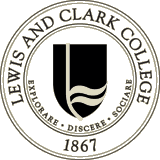Albany College
 |
|
| Motto | Explorare, Discere, Sociare (Latin) |
|---|---|
|
Motto in English
|
To explore, to learn, to work together |
| Type | Private |
| Established | 1867 |
| Endowment | $212.0 million (2016) |
| President | David Ellis (interim) |
|
Administrative staff
|
745 (All three schools) |
| Students | 3,504 (fall 2014) |
| Undergraduates | 2,179 (fall 2014) |
| Postgraduates | 1,325 (fall 2014) |
| Location |
Portland, Oregon, United States 45°27′03″N 122°40′12″W / 45.450891°N 122.670117°WCoordinates: 45°27′03″N 122°40′12″W / 45.450891°N 122.670117°W |
| Campus | Residential, 137 acres |
| Colors | Orange and Black |
| Nickname | Pioneers |
| Mascot | "Pio" the Newfoundland |
| Website | lclark |
| University rankings | |
|---|---|
| National | |
| Forbes | 156 |
| Liberal arts colleges | |
| U.S. News & World Report | 87 |
| Washington Monthly | 86 |
Lewis & Clark College is a private liberal arts college located in Portland, Oregon. It has an undergraduate College of Arts and Sciences, a School of Law, and a Graduate School of Education and Counseling. Lewis & Clark is a member of the Annapolis Group of colleges with athletic programs competing in the National Collegiate Athletic Association's Division III Northwest Conference. Just over 2,000 students attend the undergraduate College of Arts and Sciences, with a student body from more than 50 countries across six continents as well as most U.S. states. The School of Law is best known for its environmental law program, while the Graduate School of Education & Counseling is active in community engagement and social justice.
Originally chartered as the Albany Collegiate Institute in 1867 in the town of Albany, the school moved to the Portland campus in 1938 and in 1942 adopted the name Lewis & Clark College after the Lewis and Clark Expedition. Today, the three schools and their supporting offices occupy a campus of 137 acres (554,000 m²), centered on the M. Lloyd Frank Estate on Palatine Hill in the Collins View neighborhood of Southwest Portland.
Like many modern universities, the institution that would eventually become Lewis & Clark was initially intended to provide secondary as well as higher education for a specific religious community, in this case Presbyterian pioneers in Oregon's Willamette Valley. To this end the Presbyterian church incorporated Albany Academy in 1858, making Lewis & Clark one of four Oregon colleges with foundations predating Oregon's statehood (along with Willamette University, Pacific University, and Linfield College). Within a decade of its founding, Albany Academy began to focus more exclusively on higher education, changing its official name to the Albany Collegiate Institution in 1866. Lewis & Clark's official founding date comes from the current charter, which has been legally valid since the Presbyterian church reincorporated the Albany Collegiate Institution as Albany College in 1867. Unlike most Oregon colleges of the pioneer-era, the college has been coeducational since the first class, which graduated in 1873. The early campus of 7 acres (28,000 m2) in Albany was situated on land donated by the Monteith family. In 1892, the original school building was enlarged, and in 1925 the school relocated south of Albany where it remained until 1937.
...
Wikipedia
